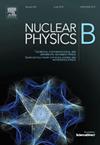Neutrino oscillations in the background of a black hole embedded in an expanding Universe
IF 2.8
3区 物理与天体物理
Q2 PHYSICS, PARTICLES & FIELDS
引用次数: 0
Abstract
In this paper, we will study the phenomenon of neutrino oscillations when traveling through the gravitational field of a black hole embedded in a spatially homogeneous and isotropic flat universe. Thus, we will compute the phase shift for neutrinos within the McVittie spacetime building upon the description of their geodesic motion. Standard assumptions of ultrarelativistic neutrinos with degeneracy between their energy eigenstates are maintained, while no screening mechanisms are needed; the correctness of our result can therefore be checked against relevant literature limiting scenarios of static isolated Schwarzschild black hole and of the Friedmann universe backgrounds, separately. We will compare and contrast the effects of local galactic and global cosmic physics, accounted for by the black hole mass and the Hubble rate, in the phase shift; its numerical value will be estimated for some realistic scenarios by re-casting it in terms of measurable astrophysical and cosmological parameters. We will identify the range of applicability of our model as for neutrinos sourced in the accelerated expansion phase of the universe, with the roles of the cosmological constant, dark matter and black hole mass scrutinized in the loss of coherence of the wavepackets. Our analysis will allow us to identify similarities and differences in the interaction between neutrinos and matter or gravitational fields.
嵌入膨胀宇宙中的黑洞背景中的中微子振荡
在本文中,我们将研究中微子穿过嵌入在空间均匀和各向同性平坦宇宙中的黑洞引力场时的振荡现象。因此,我们将在描述中微子测地线运动的基础上计算中微子在麦克维蒂时空中的相移。在不需要筛选机制的情况下,维持了能量本征态之间存在简并的超相对论中微子的标准假设;因此,我们的结果的正确性可以分别对照静态孤立史瓦西黑洞和弗里德曼宇宙背景的相关文献进行检验。我们将比较和对比本地星系和全球宇宙物理的影响,由黑洞质量和哈勃速率来解释,在相移中;它的数值将通过根据可测量的天体物理和宇宙学参数对其进行重新建模来估计。我们将确定我们的模型在宇宙加速膨胀阶段产生的中微子的适用性范围,并仔细研究宇宙常数、暗物质和黑洞质量在波包相干性损失中的作用。我们的分析将使我们能够识别中微子与物质或引力场之间相互作用的异同。
本文章由计算机程序翻译,如有差异,请以英文原文为准。
求助全文
约1分钟内获得全文
求助全文
来源期刊

Nuclear Physics B
物理-物理:粒子与场物理
CiteScore
5.50
自引率
7.10%
发文量
302
审稿时长
1 months
期刊介绍:
Nuclear Physics B focuses on the domain of high energy physics, quantum field theory, statistical systems, and mathematical physics, and includes four main sections: high energy physics - phenomenology, high energy physics - theory, high energy physics - experiment, and quantum field theory, statistical systems, and mathematical physics. The emphasis is on original research papers (Frontiers Articles or Full Length Articles), but Review Articles are also welcome.
 求助内容:
求助内容: 应助结果提醒方式:
应助结果提醒方式:


